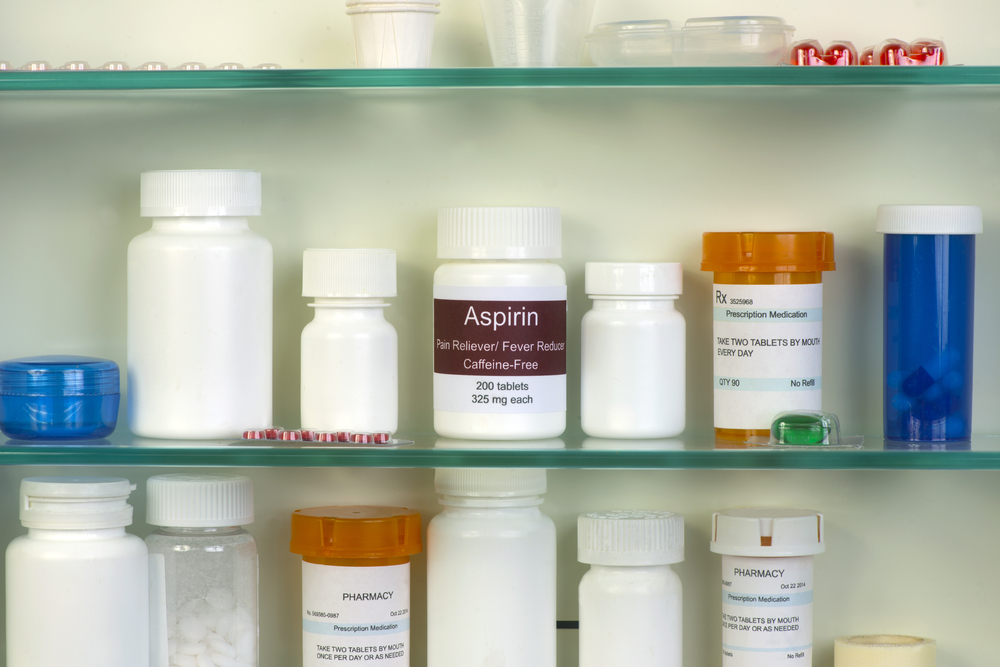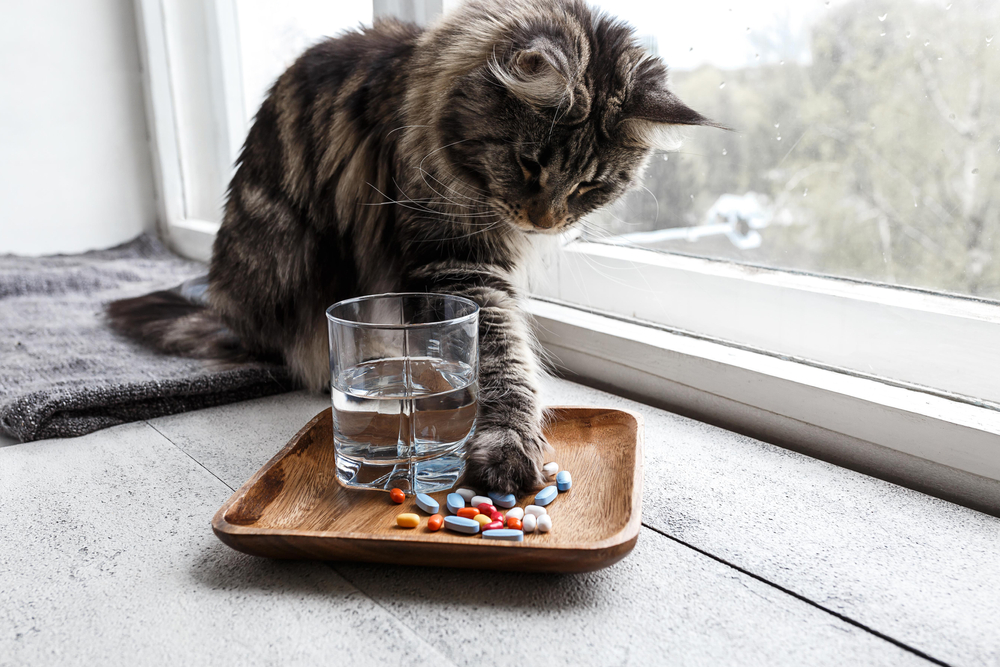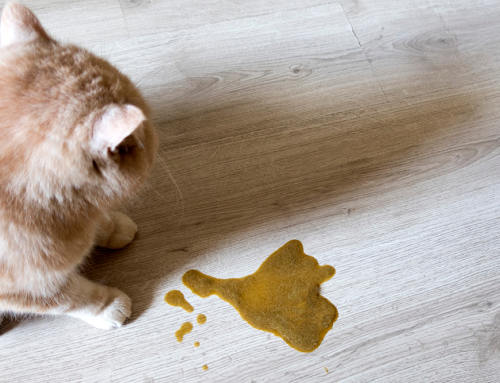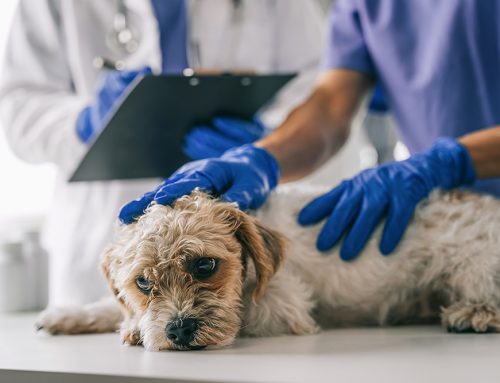When considering pet dangers, do you think of cars, aggressive animals, and infectious diseases? You wouldn’t be wrong. However, one particular pet danger many pet owners overlook is human medications. Many medications intended for people can be highly toxic to pets and are a common pet poisoning cause each year. Learn how to protect your pet by reading our Wellness Animal Hospital team’s description of common prescription and over-the-counter (OTC) medications that pose risks to your four-legged friend.
Over-the-counter medication dangers to pets
When you have a headache, you likely reach for a pain reliever to ease the pounding. OTC meds are beneficial for people, but you should never treat your pet’s pain with them. Keep your pet away from these unsafe OTC medications:
- Nonsteroidal anti-inflammatory drugs (NSAIDs) — NSAIDs, including ibuprofen, naproxen, and aspirin, often poison pets. NSAID toxicity signs include vomiting, abdominal pain, pale gums, weakness, tremors, and seizures. If your pet ingests a high NSAID dose, they can develop severe gastrointestinal (GI) ulcers and kidney failure.
- Acetaminophen — Another common pain reliever, acetaminophen (Tylenol), can be fatal to pets, especially cats. Acetaminophen poisoning can damage your pet’s red blood cells, leading to difficulty breathing, facial and paw swelling, and liver failure. Acetaminophen can also irreversibly damage your pet’s kidneys.
- Cold and flu medications — Ingredients, including pseudoephedrine, are included in many cold and flu medications. These medications can cause elevated heart rates, seizures, and death in pets. Many cold and flu meds combine pseudoephedrine, acetaminophen, ibuprofen, and phenylephrine in their products, which are potentially toxic to your pet if they ingest these drugs.
Prescription drug pet dangers
Many people take prescription drugs each day to treat physical and mental health conditions. Since so many pills are prescribed to people, you need to be mindful of ensuring your pet can’t get into these medications. Common drugs that can poison your pet include:
- Antidepressants — Antidepressants treat depression, anxiety, and phobias. Sometimes, veterinarians prescribe low-dose antidepressants to pets to treat behavior disorders. However, a high antidepressant dose can harm your furry pal. Medications, such as selective serotonin reuptake inhibitors (SSRIs) and serotonin-norepinephrine reuptake inhibitors (SNRIs) can lead to agitation, tremors, seizures, and serotonin syndrome in pets.
- Attention deficit hyperactivity disorder (ADHD) medications — Drugs used to treat ADHD, such as Adderall and Ritalin, can be hazardous for pets. These drugs are stimulants that adversely affect pets by causing an elevated heart rate and body temperature, tremors, seizures, and potentially death.
- Sleep aids and muscle relaxants — Many people have sleepless nights, so sleep aids are commonly found in many homes. Medications containing benzodiazepines or zolpidem (Ambien) can cause sedation, incoordination, and respiratory depression in pets. Additionally, muscle relaxants, such as baclofen and cyclobenzaprine, can cause profound weakness, lethargy, and seizures.
- Blood pressure medications — If your pet ingests, a beta-blocker, such as atenolol (Tenormin), metoprolol succinate (Toprol), or carvedilol (Coreg), they can develop dangerously low blood pressure and an extremely slow heart rate. Angiotensin-converting enzyme (ACE) inhibitors can also result in low blood pressure, lethargy, weakness, vomiting, and diarrhea.
Pet-proofing your home to prevent medication poisoning

The best way to protect your pet from medication toxicity is to ensure you keep all drugs out of your furry pal’s reach. To help keep your pet safe, follow these pet-proofing tips:
- Store medications securely — Store all medications, including vitamins, in a closed closet, cabinet, or on a high shelf inaccessible to your pet. Never leave pill bottles or loose pills on a nightstand or other low tables. In addition, prevent your pet from coming into contact with nicotine patches or topical ointments, as these can be toxic.
- Separate your medications from your pet’s medications — Separate your medications from your pet’s to avoid accidental mix-ups.
- Pick up dropped pills — Pick up dropped pills or capsules and wipe up spilled liquid medications. Pets are likely to think these medications are edible and would ingest them.
- Discard medications appropriately — Discard expired medications by taking them to a pharmacy that participates in a medication drop-off program. Many pharmacies have boxes for old medicines.
- Consult a veterinary professional — Never give your pet medications without first consulting your veterinarian.
- Be prepared — Always contact our Wellness Animal Hospital team or the American Society for the Prevention of Cruelty to Animals (ASPCA) Animal Poison Control Center if your pet has ingested any medications that were not prescribed for them.
Medications that are safe for you aren’t always safe for your furry pal. By taking precautions and being informed, you can help keep your pet safe and healthy. If you have additional questions about human medications and your pet, call our Wellness Animal Hospital team.







Leave A Comment